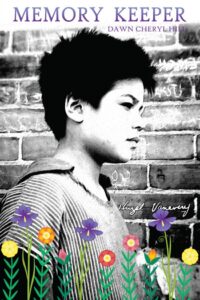Book Review: Memory Keeper
Dawn Cheryl Hill is an indigenous author who dedicated her book to the memory of all of the strong, fearless women in her life; first and foremost her mother, Hazel Leona Van Every Quissy-Hill.
Undergoing therapy for anxiety and depression, Hill began a journal to capture the memories that came to her. This technique is known as “narrative therapy” in today’s lingo, and it became a way to re-story her life. She began by writing down her dreams, keeping track of smells and sounds that triggered remembrances. Tapping into these memories she was able to “write herself better”.
She recalled days of sitting with her grandmother while she took old fabrics from shirts, pants, skirts, and woollens to repurpose them into quilts. It was relaxing and satisfying.
Dawn was in school writing a paper on Diversity and Oppression. Wanting to learn something about her mom’s and auntie’s experiences at the Mush Hole, she asked her mom, “How old were you when you went there?” Her mom’s eyes went blank, opening and closing rapidly, as if she no longer saw her. Hill described her mother as “morphing into the girl with far away eyes” (page 18). She was seeing her mother dissociate, which was so disturbing that she didn’t ever bring the subject up again. Over time, she wondered if her mother’s silence was to protect her or to protect herself.
After her mom died at the age of 60, Hill talked to her aunties and others who survived to hear stories of the Mush Hole that offered some insight into who her mother was.
Arriving at the age of eight or nine and being released at the age of 16, she never spoke another word in her original language, unless she did it in secret, if she even remembered.
At an Orange Shirt Day on September 30, 2017, Dawn attended the Moving Forward Together event held at Woodland Cultural Centre in Brantford, Ontario. Asking her older sister Vera Jane to attend with her, Vera declined and Dawn went on her own. She describes walking into a large white tent where language speaker Amos Keye was delivering the Thanksgiving. He introduced other dignitaries and First Nations chiefs who also shared words in their own languages. Stories were rendered by Indian Residential School Survivors about their own experiences at the Mush Hole.
Following that, the attendees went on a virtual tour of the building, which was at that time being renovated thanks to a successful fundraising campaign dubbed Save the Evidence.
It is at this juncture that Hill begins to describe with great clarity the overwhelming impact of seeing the scenes and evidence of her mom’s experiences at Indian Residential School. She spoke with Ida Martin, a Resolution Health Support Worker with the Ontario Residential Support Services, and gained evidence of her mom’s experiences at Indian Residential School. Her first Orange Shirt Day ceremony marked a watershed moment in Hill’s discovery of the information that her mom spent a lifetime protecting her from.
The next two-thirds of the book contain a sequence of anecdotal remembrances from Hill’s growing up years on the reserve. Many of these will resonate with other band members who grew up in similar circumstances, perhaps paralleling a few readers’ own coming-of-age adventures.
Dawn Cheryl Hill. Memory Keeper. Six Nations: Ojistoh Publishing, 2021.
ISBN: 9780968710647



